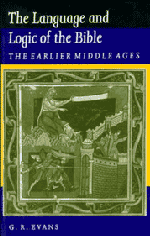Book contents
- Frontmatter
- Contents
- Preface
- Acknowledgements
- List of abbreviations
- List of ancient and mediaeval sources
- Biographical notes
- Introduction
- Part I The background
- 1 The monastic way
- 2 Bible study in the schools
- 3 A standard commentary: the Glossa Ordinaria
- Part II Lectio: surface and depths
- Part III Disputatio
- Conclusion
- Notes
- Select bibliography
- Index
2 - Bible study in the schools
Published online by Cambridge University Press: 01 June 2011
- Frontmatter
- Contents
- Preface
- Acknowledgements
- List of abbreviations
- List of ancient and mediaeval sources
- Biographical notes
- Introduction
- Part I The background
- 1 The monastic way
- 2 Bible study in the schools
- 3 A standard commentary: the Glossa Ordinaria
- Part II Lectio: surface and depths
- Part III Disputatio
- Conclusion
- Notes
- Select bibliography
- Index
Summary
The academic way
Bec was exceptional under Lanfranc and Anselm, in Lanfranc's day in having external students, and under Anselm in the philosophical quality of the teaching. As a rule the monastic schools seem to have been modest in their aspirations and achievements on the intellectual side, however high the standard of spiritual striving they expected from their pupils. The primary need within the monastic life was for proficiency in reading and singing, so that the liturgical round could be sustained and each monk derive some benefit from his reading of the Bible and the Fathers over and above what he heard read to him each day in chapel or at mealtimes. It was a utilitarian education, in the mediaeval sense of utilitas: designed in the right proportions to be profitable to the whole man – body, mind and soul.
But there were schools of another sort, often ephemeral, consisting of a single wandering master and his pupils, or a small group of such masters. Anselm spent three years in Burgundy on his way from Italy to northern France in search of the best masters. He went to Normandy specifically ‘to see, talk to and stay with’ Lanfranc, says his biographer Eadmer. Anselm did not remain a wandering scholar for long, but he was for a time engaged in a search which attracted many able young men in the last decades of the eleventh and the early years of the twelfth centuries: for the best possible teaching, in the liberal arts and the study of the Bible.
- Type
- Chapter
- Information
- The Language and Logic of the BibleThe Earlier Middle Ages, pp. 27 - 36Publisher: Cambridge University PressPrint publication year: 1984



